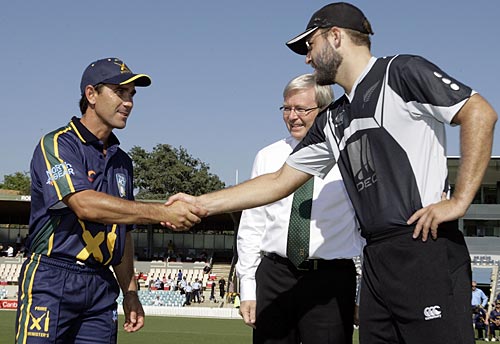Justin Langer was a tough opening bat in the great Australian sides led by Steve Waugh and Ricky Ponting, his flintiness often overshadowing a deceptively efficient strokemaker. In a team filled with marquee names, he seldom got the credit he deserved.
Daniel Vettori has been New Zealand’s outstanding bowler for the past 15 years, notching up 681 wickets in all formats of the game. His batting, however, still has the ‘what if’ look of Ridley Scott’s ‘American Gangster’. All those beautiful shots… if only we could have had a little more depth. With a bit more application, Vettori would have a much better batting average than 30.10.
So. An Australian and a New Zealander.
Besides a healthy antipodean dislike for each other, they share another common ground: pressure brings the best out of them.
Langer averages 68.75 batting in the fourth innings of Test matches away from home. That’s almost 23 runs more than his career average. Vettori’s fourth innings average away from home is (for a bowling allrounder) a very impressive 38.50, almost 8 runs higher than his career average.
Batting in the fourth innings of a Test is, by common consent, one of the more difficult tasks in cricket. By the time the fourth innings rolls around, it’s usually at least Day Four of a 5-day Test match and the pitch has more cracks on it than a Bollywood actress’s face without makeup. The ball turns, keeps low, spits up, reverse swings. It’s a tough grind at the best of times. When playing away from home, it gets even harder. The reputations of many a fine career have been dismembered in these sessions.
I am a fourth-innings man. I work best when under the pump. When working against an imminent deadline, sat in front of the computer, I go into a pensive mood, cradling my chin on my right thumb, with the index finger pointing to the skies in a classic Godfather pose. My family knows better than to disturb.
In a more serious vein, man is said to be at his most creative when faced with daunting odds. Even renowned business schools follow this model. Students are divided into groups, given minor sums of money and asked to multiply it within a particular time-frame, say 2 or 3 hours. Delhi University students recently generated Rs 1.22 lakh from just Rs 7,500 within six hours on the streets of Delhi. It’s a way to challenge yourself.
These past few months, I did some of my best writing when applying for admission into Master’s programs in journalism. I got into some, could not accept their offers because they didn’t offer a scholarship, and didn’t get into others. Regardless of the results, the experience of writing Statements of Purpose has proved to be unexpectedly enriching. The very name — Statement of Purpose — had suggested a drab experience wherein I’d furnish platitudes about how elite the Master’s program at a particular institution was and how privileged I’d be to be admitted there.
But it was, instead, a wonderful voyage of self-discovery. For instance, I realised that my father has been the most influential person in my life. (Easy to say, hard to realise); that David Halberstam’s ‘Summer of 49’, which I once picked up for Rs 100 (about USD 2 then), was the most important sports book I’ve read; that ‘The Verdict’ is my favourite movie and that Economics can actually be a very interesting subject.
Writing SOPs (Statements of Purpose) has resulted in a strange phenomenon. Nowadays, when I place my hands on my laptop, the left ring finger hovers over the Ctrl key and the right index finger deftly rests on the Left Arrow. This is because I edit stories backwards i.e, I move from the period, back to the part that needs correction by using the Ctrl+Left Arrow combination.
Once I finish the correction, I go back to the start of the paragraph and run over the entire content, from right to left, using the Ctrl+Right Arrow combination. My hands have become so used to the rhythm of this process that sometimes my fingers look as if they’re involved in a sexual act with the keyboard. Such is the plight of aspiring writers.
Anyway, here are the final couple of articles that were published at http://www.ibnlive.in.com in April. I couldn’t update them as I was caught up in the application process.
a) Why Barcelona Must be Afraid
This was written just before the UEFA Champions League semifinal clash between Barcelona and Bayern Munich. Bayern had just steamrollered Juventus, the champions of Italy, in their quarterfinal meeting and I had said Barcelona better watch out for the Germans. Bayern duly gave a footballing masterclass to the Spaniards, winning the tie emphatically by an aggregate score of 7-0. They also went on to win the Champions League final against Borussia Dortmund.
b) Bayern Flex Muscles, Real Just Glide
This covered the first leg of the quarterfinal clashes between Bayern and Juventus, and Real Madrid and Turkish side Galatasaray. Bayern were dominant even in the first leg and could have wrapped up qualification then and there. Juve were lucky to survive. Real strolled to an easy 3-0 win against Galatasaray, but would make life difficult for themselves in the second leg. They eventually went out in the semifinals, losing out to Jurgen Klopp’s underrated Borrussia Dortmund.



